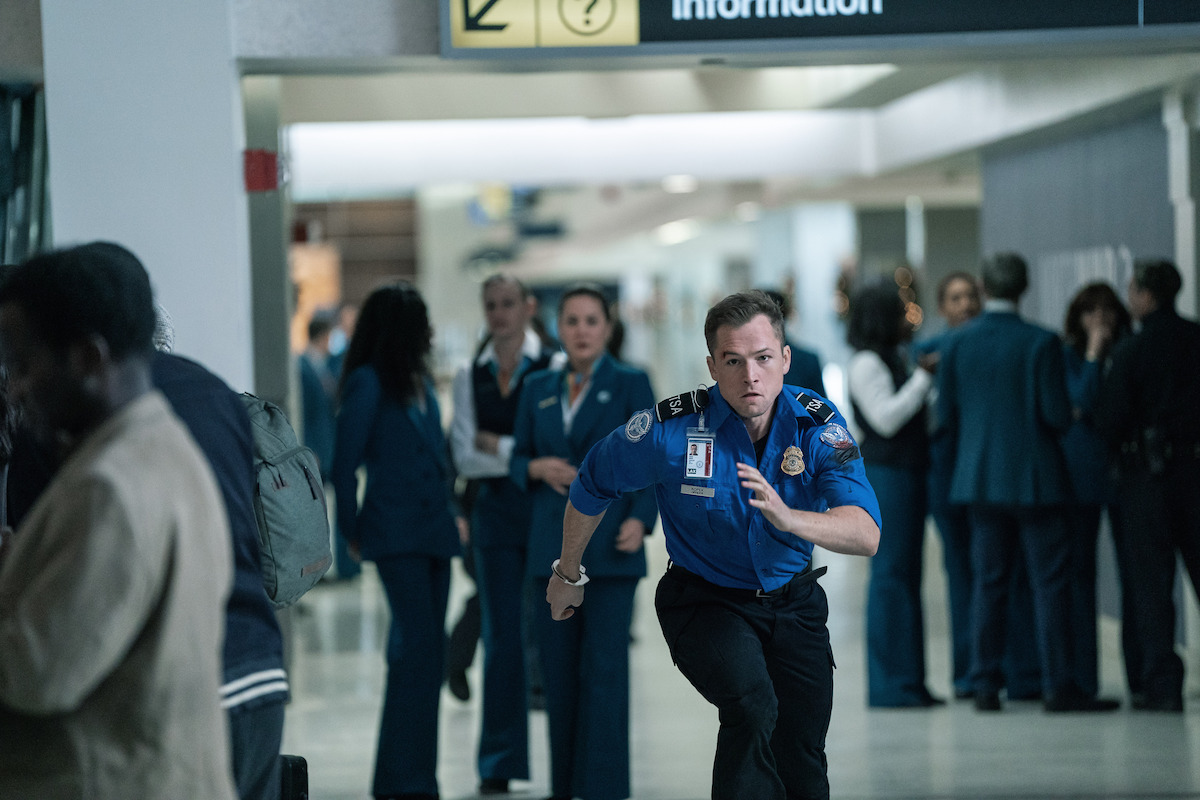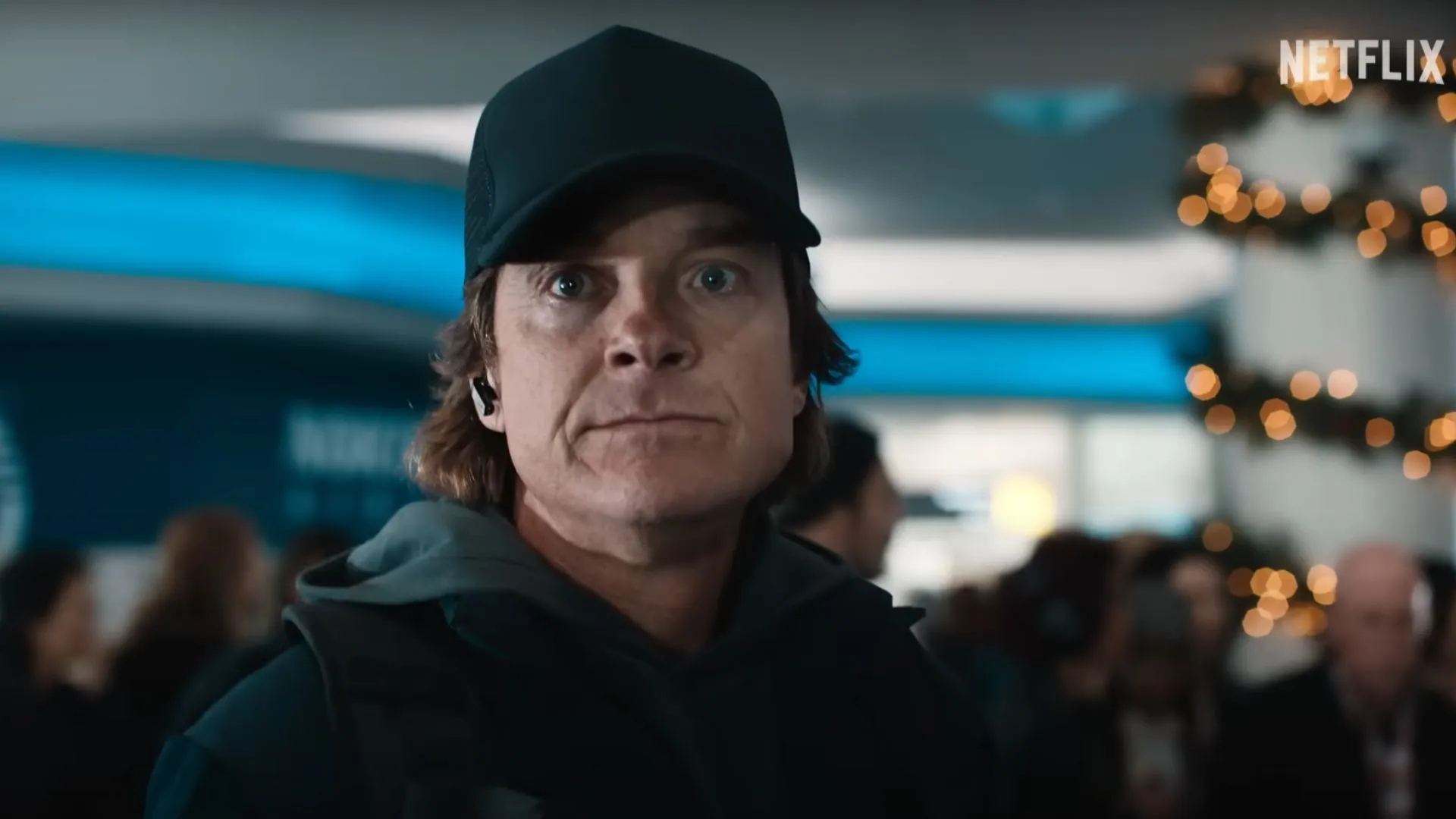
If you threw Die Hard and Phone Booth into a blender, you’d get Carry-On. It’s a throwback to the action films of the 80s and 90s, blending the best of old-school thrills with a modern sensibility, all wrapped up in a Christmas setting that’s both disquieting and oddly fitting. This isn’t your typical holiday movie; there are no warm family reunions or sentimental moments of togetherness. Instead, Carry-On is about isolation, tension, and the quiet chaos that can unfold during the most “wonderful time of the year.”
The plot centers around Ethan Kopek (played by Taron Egerton), a man whose Christmas season isn’t filled with joy but with a steady unraveling of his emotional state. Like Die Hard, Carry-On uses the holiday as a backdrop—an external world full of festivity that’s in stark contrast to Kopek’s internal turmoil. The setting doesn’t sugarcoat the season; instead, it reflects Alden’s disconnection from the world, amplifying his isolation. The film doesn’t want to make you feel warm and fuzzy; it makes you feel cold, adrift in the distance between Alden’s mind and the world around him.
Egerton’s performance is one of the film’s biggest assets, carrying the weight of the entire narrative with a brooding, almost uncomfortable stillness. Alden is a man haunted by something—though the film doesn’t fully reveal the extent of his past until later. His portrayal is more about quiet desperation than overt action, and it’s this nuance that makes Carry-On feel different from a typical holiday action flick. You can’t imagine the movie working without him in the lead, and it certainly wouldn’t have the same emotional resonance if it weren’t for the gravity he brings to the role.
But it’s not just Egerton who carries the film—Jason Bateman delivers a fantastic supporting performance that adds a much-needed balance. His role, initially shrouded in mystery, becomes a pivotal element of the film’s intrigue. Bateman’s sharp wit and dry delivery provide the perfect contrast to Egerton’s more restrained performance, and their scenes together are some of the most engaging moments in the movie. The reveal of Bateman’s character—one I hadn’t anticipated before watching—was an excellent twist that added an extra layer of enjoyment to the experience. Without Bateman, the film would likely fall flat, as his dynamic with Quinn anchors the more chaotic elements of the plot.

The dialogue in Carry-On doesn’t strive to be deep or profound; it does exactly what it needs to. Much like the action movies it’s inspired by, the script often serves as a vehicle for moving the plot along, with a few moments of banter that help define the characters, especially during the exchanges between Egerton and Bateman. The dialogue, though basic at times, is perfect for what the film is aiming for. This isn’t a movie that’s trying to win any awards for best screenplay—it’s here to entertain. It’s a throwback to simpler times when action was about the adrenaline rush and less about pithy dialogue. The film knows this, and it leans into it.
And while the dialogue might feel like an afterthought at times, the structure of the film is anything but lazy. Each situation builds on the last, with tension mounting steadily throughout. There’s a real craftsmanship in how Carry-On keeps the viewer engaged with one scenario after another, all linked together by an underlying narrative that’s hard to ignore. As the story progresses, you get the sense that the filmmakers really understood how to keep the pacing tight, using each moment to heighten the suspense without dragging the action on for too long. It’s a slow burn that never overstays its welcome, and even in its quieter moments, the film keeps you on edge.
But despite all of its strengths, Carry-On does face a few stumbling blocks, particularly when it moves beyond its core, contained premise. Director Jaume Collet-Serra does an admirable job orchestrating the film’s emotional beats and action scenes within the limited scope of the setting, but when the narrative expands or introduces new elements outside of that contained space, the tension sometimes falters. These moments feel like they’re pulling away from what makes the movie work best—the focus on Kopek’s internal battle and the raw, unvarnished tension of his situation. When the film leans too much into external conflict or unnecessary narrative flourishes, it loses some of the intimacy and psychological depth that made the early scenes so gripping.

Visually, Carry-On isn’t about grandiose spectacle, but about playing with small details to enhance the story. The Christmas setting is used subtly, with the cold, sterile holiday decorations feeling more like reminders of Alden’s emotional distance than markers of joy. There’s a deliberate choice in how the Christmas imagery is framed—it’s not about the festive cheer, but about what’s missing from Alden’s life. The muted colors and almost detached camera work create an atmosphere of detachment that mirrors Alden’s mental state. You’re never quite comfortable, never quite at ease, and that’s precisely the point.
As an action movie, Carry-On is a lot of fun, but it’s also more thoughtful than you might expect from a holiday thriller. The action scenes are sharp and well-choreographed, hitting the mark without overstaying their welcome. They feel like a callback to the glory days of 80s and 90s action films, when the stunts were as much about the tension as they were about spectacle. There’s a certain coolness to how the action unfolds—nothing too flashy, but just enough to keep you invested in the story. The film knows exactly what it’s doing, and that self-awareness is a big part of its charm.
In many ways, Carry-On is a holiday movie for people who don’t necessarily buy into the standard Christmas fluff. There’s no grand, redemptive arc here—no heartwarming message about family or togetherness. Instead, you get a raw, unfiltered look at a man who’s lost, drifting through a holiday season he can’t connect with. It’s a holiday thriller that embraces its genre roots while offering enough psychological depth to make it stand out. The movie is unpretentious in the best way, delivering exactly what it promises: a fun, engaging, and occasionally dark action flick set against the backdrop of a fractured holiday season.
Rating: ★★★★★★☆☆☆☆ (6.5/10)
